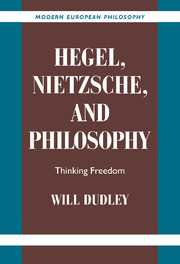Book contents
- Frontmatter
- Contents
- Acknowledgments
- List of Texts, Translations, and Abbreviations
- Introduction: Freedom and Philosophy
- PART I FREEDOM IN AND THROUGH HEGEL'S PHILOSOPHY
- 1 The Place of Freedom in Hegel's Philosophy
- 2 The Freedom of Willing: Hegel's Philosophy of Right
- 3 Freedom beyond Willing: From the Philosophy of Right to Absolute Spirit
- 4 Freedom through Hegel's Philosophy
- PART II FREEDOM IN AND THROUGH NIETZSCHE'S PHILOSOPHY
- Conclusion: Philosophy and Freedom
- Notes
- Index
2 - The Freedom of Willing: Hegel's Philosophy of Right
Published online by Cambridge University Press: 09 July 2009
- Frontmatter
- Contents
- Acknowledgments
- List of Texts, Translations, and Abbreviations
- Introduction: Freedom and Philosophy
- PART I FREEDOM IN AND THROUGH HEGEL'S PHILOSOPHY
- 1 The Place of Freedom in Hegel's Philosophy
- 2 The Freedom of Willing: Hegel's Philosophy of Right
- 3 Freedom beyond Willing: From the Philosophy of Right to Absolute Spirit
- 4 Freedom through Hegel's Philosophy
- PART II FREEDOM IN AND THROUGH NIETZSCHE'S PHILOSOPHY
- Conclusion: Philosophy and Freedom
- Notes
- Index
Summary
The goal of this chapter is to understand Hegel's conception of the freedom of willing. Understanding this conception requires understanding its development out of Hegel's criticisms of two other conceptions of the freedom of willing, that of liberalism and that of Kant, which he deems insufficiently comprehensive.
Hegel's criticisms of liberal choice and Kantian autonomy, and his own more comprehensive conception of the freedom of willing, are presented most fully in his Philosophy of Right. The Introduction develops and criticizes the liberal conception of freedom as choice; the second main section, on morality, develops and criticizes the Kantian conception of autonomy; and the third and final main section, on ethical life, incorporates choice and morality into Hegel's own conception of the freedom of willing as participatory citizenship in a rational state.
The heart of this chapter therefore consists of an analysis of these crucial sections of the Philosophy of Right. Morality is the particular focus, because it is the penultimate stage of objective spirit. For this reason, understanding the externalities that limit the freedom of willing subjects in morality is the key to understanding the liberation of those subjects in ethical life. Ethical life, as the final stage of objective spirit, provides the most comprehensive conception of the freedom available to the willing subject.
Understanding the finitude or incomplete freedom of the moral will, and its liberating reconception in ethical life, requires understanding parts of Hegel's discussion of the concept of judgment in the Logic.
- Type
- Chapter
- Information
- Hegel, Nietzsche, and PhilosophyThinking Freedom, pp. 28 - 68Publisher: Cambridge University PressPrint publication year: 2002



